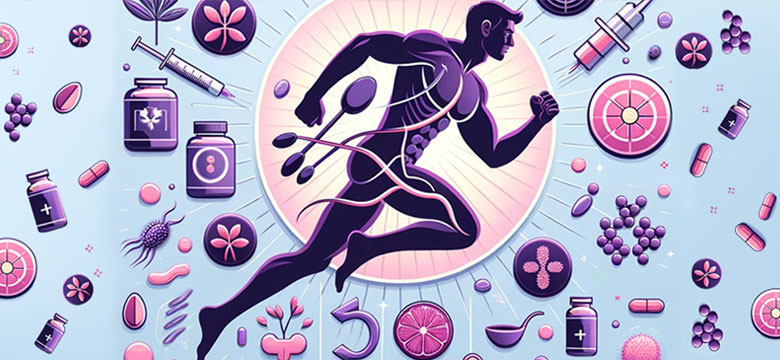When couples face challenges with fertility, male factors such as sperm quality often play a critical role. The quality of sperm refers to its ability to fertilize an egg and contribute to the formation of a healthy embryo. Some factors that influence male fertility, such as genetics, illness, or age, cannot be controlled. Abnormal sperm can make it more difficult to fertilize the woman’s egg, however, fortunately, there are things you can do to improve your sperm health and, therefore, your chances of successfully conceiving.
Understanding sperm quality involves assessing various factors through a process called semen analysis. Some the main factors considered when evaluating sperm quality are as below:
1 - Sperm Count (Sperm Concentration):
This measures the number of sperm present in one milliliter of semen. A normal sperm count is usually considered to be 15 million sperm per milliliter or higher.
2 - Sperm Motility
This assesses the ability of sperm to move and swim. Motility is crucial for sperm to reach and fertilize an egg. The evaluation includes the percentage of progressively motile sperm and the total motile sperm count.
3 - Sperm Morphology
This examines the shape and structure of sperm. Ideally, a high percentage of sperm should have a normal shape. Abnormalities in sperm morphology can affect their ability to penetrate and fertilize an egg.
4 - Semen Volume
This measures the amount of semen produced during ejaculation. A normal semen volume is typically above 1.5 milliliters.
5 - Sperm Viability (Vitality)
This indicates the percentage of live sperm in a semen sample. Viability is an important factor, as only live sperm can fertilize an egg.
6 - Genetic Factors
While not directly assessed in a routine semen analysis, genetic factors can play a role in sperm quality. Genetic testing may be considered in specific cases or when there is a history of genetic conditions.
Sperm analysis results may vary depending on your age, health history, and other things. Your test results may be different depending on the lab used. They may not mean you have a problem. Ask your healthcare provider what your test results mean for you.
More information about male infertility can be found here.
Supplements for Improving Sperm Health
Research has identified several nutritional supplements that may improve male fertility.
Here’s a concise guide to supplements that promise to enhance sperm health.
Antioxidants:
- Zinc: Integral for testosterone production and seminal fluid, zinc supplementation can increase sperm count and motility, particularly in men with zinc deficiencies.
- Selenium: As an antioxidant, selenium helps reduce oxidative stress, which is known to improve sperm viability and motility.
- Vitamin C and E: These vitamins act as antioxidants, safeguarding sperm DNA from oxidative stress and potentially improving the sperm's overall ability to fertilise an egg. Some studies suggest that antioxidant supplementation may improve sperm morphology.
Amino Acids and Coenzymes:
- Coenzyme Q10: This antioxidant is crucial for energy production within sperm cells. Some studies suggest that CoQ10 supplementation may improve sperm parameters, including morphology.
- L-Carnitine: L-carnitine is an amino acid that plays a role in energy metabolism. Some studies suggest that L-carnitine supplementation may have a positive impact on sperm quality, including morphology.
Fatty Acids:
- Omega-3 Fatty Acids: Omega-3 fatty acids, particularly docosahexaenoic acid (DHA) and eicosapentaenoic acid (EPA), are essential for sperm health. These fatty acids are found in fish oil supplements and may positively impact sperm morphology.
Vitamins:
- Vitamin D: Adequate vitamin D levels are essential for overall health, and research has indicated a potential connection between vitamin D deficiency and poor sperm quality. Ensuring sufficient vitamin D intake may benefit sperm motility and morphology
Minerals:
- Folic Acid: Often used in combination with zinc, folic acid supports sperm's genetic material and may lead to an increase in overall sperm count. Some studies indicate a potential link between folic acid supplementation and improved sperm morphology.
Herbal Supplements:
- Ashwagandha (Withania somnifera): An adaptogenic herb that has been traditionally used to improve sperm count and motility.
It’s important to note that individual responses to supplements can vary, and excessive intake of certain vitamins and minerals can have negative effects. Before starting any supplementation regimen, individuals should consult with a healthcare professional, preferably a reproductive specialist or urologist, to determine the most appropriate approach based on their specific situation and health status.
What are the other factors to improve sperm health?
1 - Lifestyle Changes:
- Diet: Adopt a balanced and nutritious diet rich in antioxidants, vitamins, and minerals.
- Exercise: Engage in regular physical activity to maintain a healthy weight and improve overall well-being.
- Avoidance of Harmful Substances: Minimize or quit consuming tobacco, excessive alcohol, and recreational drug use.
2 - Maintaining a Healthy Weight:
- Obesity has been linked to lower sperm quality, so achieving and maintaining a healthy weight can be beneficial.
3 - Stress Management:
- Chronic stress can negatively impact sperm health, so incorporating stress-reducing activities such as meditation, yoga, or mindfulness may be helpful.
4 - Avoiding Heat Exposure:
- Prolonged exposure to high temperatures, such as hot baths or saunas, may affect sperm quality. Encourage practices that prevent excessive heat exposure to the genital area.
5 - Regular Ejaculation:
- Regular ejaculation (but not too frequent) may help maintain sperm quality.
6 - Medical Interventions:
- Consultation with a healthcare professional or a fertility specialist can lead to medical interventions tailored to the individual's needs. This may include hormone therapy, medications, or surgical procedures.
7 - Avoiding Environmental Toxins:
- Minimize exposure to environmental toxins, such as pesticides, chemicals, and pollutants, which may negatively impact sperm quality.

